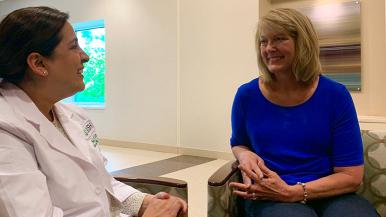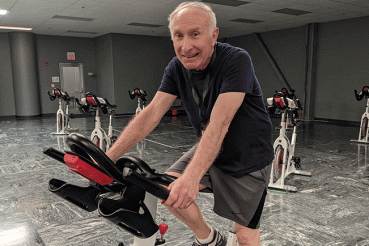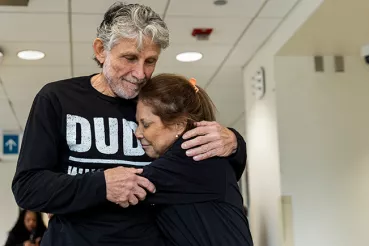Mary Pat would follow her doctor just about anywhere — and has.
Ten years ago Geneva resident Mary Pat Wright was first diagnosed with primary peritoneal cancer, or PPC, a relatively rare gynecologic cancer that is related to ovarian cancer. She has since faced three bouts of PPC — and has seen Amina Ahmed, MD, gynecologic oncologist and director of Rush University Cancer Center, through it all.
“When I was first diagnosed, I was told I had less than 50% chance of being here in five years. I’ve been here 10,” Mary Pat says. “Dr. Ahmed has been with me the whole way. I can’t say enough about what she does."
Personal care
The cancer diagnosis “rocked my world,” Mary Pat says, “but Dr. Ahmed gave me the time I needed and the words I needed. She gave the guidance to breathe through it. When I met her, I knew she was the right doctor for me.”
Several years after Mary Pat’s initial diagnosis, Ahmed moved to University of Iowa — and Mary Pat followed her there, driving three-and-a-half hours each way for care. “I am a faithful believer in Dr. Ahmed,” Mary Pat says. “I currently, and will continue to, place my life in her hands.”
Today, those long drives are a thing of the past now that Ahmed is back in Illinois at Rush.
“As her patient, I feel as if I am her primary focus, no matter where I am in treatment or how many times the cancer recurs,” says Mary Pat. “She understands that a lot more goes into healing than just medication. She’s always encouraged me and my husband to remember that cancer does not only occur to one person in a family but affects everybody.”
Mary Pat notes that Ahmed is always available and always has the information she needs. For example, Ahmed came in on her day off for Mary Pat’s first appointment, showing her commitment to her patients from day one. Mary Pat adds that Ahmed is genuinely interested in her patients beyond their cancer and reminds them that while cancer may affect their whole life, it is not who they are.
“I do the best I can for every single patient,” says Ahmed. “I strive for the best care for each individual and work with them to plan for what they need.”
Comprehensive cancer care
Ahmed diagnosed Mary Pat in 2009, and treated her with surgery and chemotherapy. In 2010, Mary Pat had no evidence of disease, but continued follow-ups with Ahmed, making the trip to Iowa every three months.
When Mary Pat’s cancer returned in March 2013, Ahmed was back in Illinois at Rush. “I was once again blessed to receive care from Dr. Ahmed,” Mary Pat said.
Mary Pat completed treatment at the end of summer 2013. In the fall of 2013, Ahmed gave her patient good news once again: no evidence of disease.
However, in September 2016, Mary Pat was again diagnosed with active cancer. Surgery, chemotherapy and radiation followed, and she was happy to hear “no evidence of disease” for the third time.
Ahmed put Mary Pat on a new targeted therapy for recurrent gynecologic cancers called a PARP inhibitor, which may help kill cancer cells by preventing them from repairing their damaged DNA.
For almost two years, Mary Pat has had no evidence of disease and has enjoyed a good quality of life throughout her treatment with Ahmed. Initially diagnosed before her youngest child went to college, Mary Pat has been able to see her children graduate college, get married and have children of their own — as she experiences the joys of being a grandmother.
“Mary Pat has done very well,” Ahmed says. “She received an aggressive treatment and responded very well.”
Mary Pat credits her survival to Ahmed’s expertise, the support of her family and her faith. Through it all, she has learned to slow down and appreciate what she has.
“It’s all good,” she says, “and it started with getting connected to Dr. Ahmed.”




